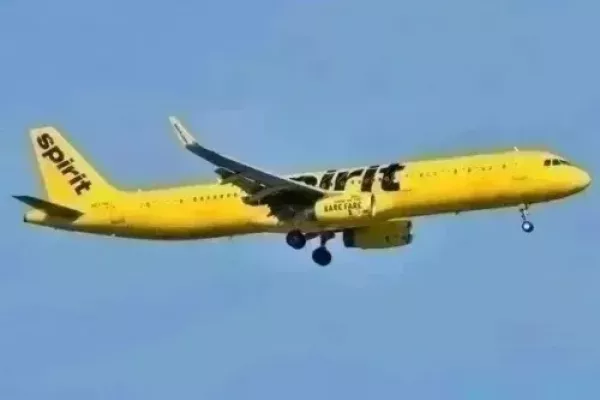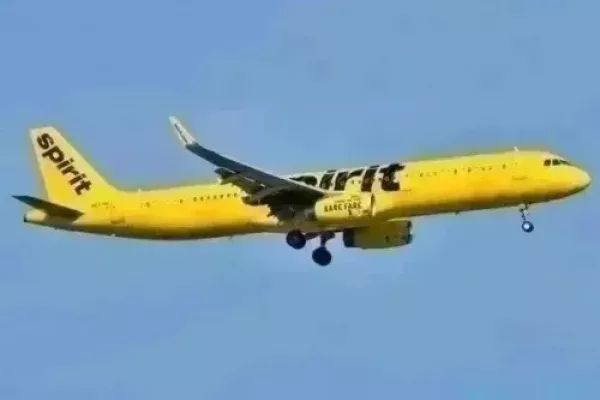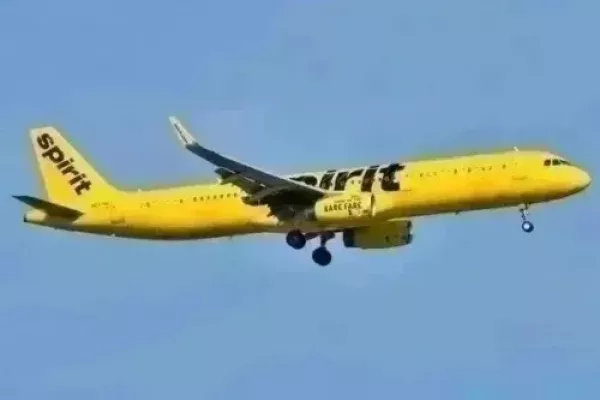Spirit Airlines Inc SAVE.N on Thursday 28 July agreed to a $3.8 billion buyout offer from low-cost rival JetBlue Airways Corp JBLU.O, ending a drawn-out battle for the carrier whose acquisition would help create the fifth-largest US airline.
Details
The victory for JetBlue comes after Spirit canceled its $2.7 billion sale to Frontier Group Holdings ULCC.O, but the potential combination is expected to kick off a fight with antitrust regulators.
JetBlue's offer price of at least $33.50 per share represents a premium of nearly 38% to the last closing price of Spirit shares. Including a "ticking fee", or small monthly payments to Spirit shareholders from January next year until the deal is completed, the offer can go up to $34.15 per share.
Spirit shares were up nearly 5% before the bell as investors cheered the end of a takeover saga that began in April.
JetBlue rose 1%, while Frontier was 1.6% higher.
Both carriers were locked in a bidding war to create a combined airline that will better compete with legacy US carriers at a time when the industry faces a labor crunch and high jet fuel costs.
Spirit had in February agreed to a $2.9 billion offer from Frontier before JetBlue jumped into the fray with in April. Despite JetBlue's better terms, Spirit had pushed for a merger with Bill Franke backed-Frontier, citing antitrust concerns with a potential JetBlue tie-up.
But it could not muster investor support for the deal and was forced to delay a shareholder vote on the proposed acquisition four times. At the latest meet that was set for Thursday 28 July, Spirit shareholders were expected to vote against a merger with Frontier, Reuters had reported.
Spirit canceled the merger with Frontier without giving details on results of the shareholder meet.
The outcome is a setback for Franke, who was instrumental in starting the talks with Spirit last year. Franke's airline-focused buyout firm, Indigo Partners, is a major shareholder in Frontier.
JetBlue, Spirit Near Takeover Deal That Could Come On Thursday-Source
The above news followed news that JetBlue Airways Corp JBLU.O is nearing a deal to buy Spirit Airlines SAVE.N that could be announced as soon as Thursday 28 July, a source familiar with the matter said, after Spirit canceled its $2.7 billion sale to Frontier Group Holdings ULCC.O.
The latest developments mark a victory for JetBlue in its months-long battle for the ultra-low-cost carrier, though the potential combination is expected to kick off a fight with antitrust regulators, who have already sued to block JetBlue's alliance with American Airlines AAL.O.
A combination of JetBlue and Spirit would create the fifth-largest US airline and be the most consequential US airline industry merger since Alaska Air Group ALK.N bought Virgin America Inc for $2.6 billion in 2016.
JetBlue is offering terms similar to what it had proposed earlier, the source said. In June, JetBlue had offered $33.50 per share for Spirit, or roughly $3.7 billion, and a breakup fee of $400 million.
It will also keep its Northeast Alliance (NEA) partnership with American but is expected to announce minor route divestitures to ease antitrust concerns, according to the source.
The Wall Street Journal first reported the potential agreement between JetBlue and Spirit.
Both JetBlue and Spirit did not respond to Reuters requests for comment outside regular business hours.
The source spoke on condition that they are not identified ahead of an official announcement of the agreement.
Earlier on Wednesday 27 July, Spirit cance'led its sale to Frontier after failing to convince shareholders about its merits.
That development, first reported by Reuters, came after Spirit pushed back a shareholder vote on the Frontier deal four times, hoping it could muster enough support. Spirit had earlier argued that antitrust regulators were unlikely to clear JetBlue's $3.7 billion bid.
The outcome was a setback for Frontier and its chairman Bill Franke, who was instrumental in kicking off talks between the sides last year. Franke's airline-focused buyout firm, Indigo Partners, is a major shareholder in Frontier.
"While we are disappointed that Spirit Airlines shareholders failed to recognize the value and consumer potential inherent in our proposed combination, the Frontier board took a disciplined approach," Franke said in a statement.
JetBlue sees Spirit as an opportunity to expand its domestic footprint at a time when the US airline industry is dogged by labor and aircraft shortages.
"We are pleased that the merger agreement with Frontier has been terminated and we are engaged in ongoing discussions with Spirit toward a consensual agreement as soon as possible," JetBlue said in a statement.
ANTITRUST RISK
But Spirit also could choose to remain independent.
The airline has expressed concern about JetBlue's partnership with American. The US Justice Department filed an antitrust lawsuit against American and JetBlue in September seeking to end the alliance, saying it would lead to higher fares in busy airports in the US Northeast.
JetBlue has refused to pull out of the alliance and instead offered sweeteners like a higher breakup fee and route divestments.
Frontier shares rose 6.4% to close at $11.27 on Wednesday 27 July as investors expressed relief that the company exited what had become a bidding war for Spirit. Spirit shares rose 4% to $24.30, while JetBlue shares rose 3.6% to $8.35.
With the end of the proposed Spirit-Frontier tie-up, Spirit will pay Frontier $25 million for merger-related costs that it incurred. As per the terms of the deal, Spirit would owe Frontier an additional $69 million if it ends up striking a merger deal with JetBlue or any other competitor within the next 12 months.
"Now that Spirit Airlines has terminated the Frontier merger agreement, we hope that Frontier management will put aside its merger distraction and invest the same amount of resources and focus to improving conditions at their own airline," said the Frontier pilots' union, which is a subset of the Air Line Pilots Association (ALPA).
UPDATE 3-JetBlue Wins Spirit Takeover Battle With $3.8 Billion Deal
All of the above news was followed by the following update:
JetBlue Airways Corp JBLU.O on Thursday 28 July prevailed in a months' long bidding war for Spirit Airlines Inc SAVE.N after the ultra-low-cost carrier accepted its $3.8 billion buyout deal.
The New York-based airline clinched the deal a day after Spirit terminated its $2.7 billion merger deal with Frontier Group Holdings ULCC.O.
JetBlue's shares were down 2.4%, while Spirit's shares were up 5.4% in afternoon trade on Thursday 28 July.
With a combined market share of 9%, the acquisition would create the fifth-largest US airline. JetBlue expects the deal to result in $600 million-$700 million in net annual synergies and accelerate its plan to operate more than 1,700 daily flights to more than 125 destinations.
But the fate of the deal, which is expected to close no later than the first half of 2024, hinges on securing regulatory approvals. That was a reason why Spirit repeatedly spurned JetBlue's offer.
Robin Hayes, JetBlue CEO, sounded confident of clearing regulatory hurdles and closing the transaction.
"We believe a more national JetBlue would have a very significant impact on lowering fares across the board," he told Reuters in an interview. "In addition, we've offered an unprecedented set of divestiture commitments."
The U.S. Justice Department has filed an antitrust lawsuit against American Airlines Group Inc AAL.O and JetBlue over their alliance at airports in Boston and New York, arguing it would lead to higher fares.
JetBlue has declined to abandon the partnership, but has offered to divest Spirit's holdings at the Northeastern airports.
The company also faces the challenge of smoothing Spirit's ruffled feathers after repeatedly questioning the integrity of its board in the run-up to the deal. Hayes, however, expressed confidence that the two sides would be able to work together.
"This is one of the toughest industries that you can compete in," he said. "So, if we're going to get upset here because of what a couple of people have said during a process, then you know we shouldn't be in these jobs."
Spirit CEO Ted Christie said JetBlue's offer serves the "best interests" of his company's shareholders and that his team would focus on closing the deal.
JetBlue's offer price of at least $33.50 per share represents a premium of nearly 38% to the last closing price of Spirit shares. Including a "ticking fee," or small monthly payments to Spirit shareholders from January next year until the deal is completed, the offer can increase to $34.15 per share.
Spirit signed a cash-and-stock deal with rival Frontier in February to form a new no-frills airline and compete against big national carriers. In April, JetBlue jumped into the fray with an all-cash offer, sparking a bidding war with Frontier.
Despite JetBlue's superior terms, Spirit pushed for a merger with Bill Franke backed-Frontier, saying U.S. regulators would block a deal with JetBlue.
But it could not muster enough investor support for the Frontier deal and was forced to delay a shareholder vote on the proposed acquisition four times.
How Spirit Airlines CEO Christie Did His JetBlue Deal U-Turn
All of the above news was followed by news that Spirit Airlines Inc SAVE.N chief executive Ted Christie had been dismissive of the possibility that regulators would allow his low-cost US airline to be sold to JetBlue Airways Corp JBLU.O for the last four months.
"You don't need to be an antitrust attorney to see the issues here," Christie stated in several media interviews after JetBlue unveiled its bid in April, gatecrashing a deal he had clinched in February to sell Spirit to Frontier Group Holdings Inc ULCC.O.
Christie argued that Spirit would cease to be a budget airline under JetBlue, driving up airfares.
Yet this week he agreed to sell Spirit to JetBlue for $3.8 billion in cash, noting in a statement that he was "thrilled to unite with JetBlue" and that he would work to "complete the transaction."
It was a reversal driven not by a change of conviction but by Spirit's failure to persuade its shareholders that they would be better off if they sold the company to Frontier for $2.7 billion in cash and stock, according to six people familiar with the matter who gave an account of the deal discussions on condition of anonymity.
Christie had tried to convince Spirit shareholders that the shares they would receive in Frontier would significantly go up in value in the next two years and more than make up for Frontier's bid being over $1 billion lower than JetBlue's.
He also argued that the Frontier deal was more likely to be approved by antitrust regulators.
His pitch was not successful and he was forced to postpone the Spirit shareholder vote on the Frontier deal four times in a bid to muster more support from investors. He secured some small financial sweeteners from Frontier to their deal, but those were not enough to change Spirit shareholders' mind.
A key moment came on July 10, when Frontier CEO Barry Biffle wrote in a letter to Spirit that his company's latest offer was its "best and final," the sources said.
Christie accepted at that point he would not get a better deal from Frontier that he could take to a shareholder vote, and he began preparations for their deal to collapse once Spirit shareholders shot it down, the sources said.
As some Spirit investors pressured the company to accept JetBlue's offer, Christie started to lay the ground for their agreement, the sources said. He instructed Spirit's bankers at Barclays and Morgan Stanley to push hard for more concessions without jeopardizing the prospects of a deal with JetBlue, the sources added.
When the Frontier deal failed to get enough backing from Spirit shareholders in a vote on Wednesday, Christie got on the phone with JetBlue CEO Robin Hayes and quickly finalized a deal, which was almost identical to JetBlue's latest offer.
Asked about the U-turn in an interview with Reuters on Thursday, Christie said the decision he and Spirit's board took was the best for his shareholders.
"It was a very rigorous review by the board," Christie said.
Christie would have received a "golden parachute" of $11.8 million had the deal with Frontier been completed. He also stands to receive a payout once the deal with JetBlue is completed, although that amount has not yet been disclosed.
News by Reuters, edited by Hospitality Ireland. Click subscribe to sign up for the Hospitality Ireland print edition.









